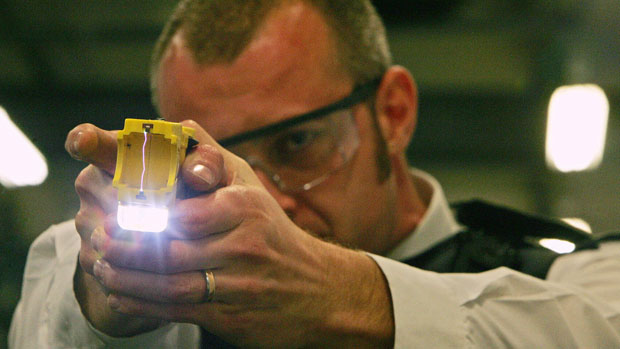Police want more officers in UK to carry Taser
Man dies after being shot with the stun gun yet many officers demanding more on the street

A free daily email with the biggest news stories of the day – and the best features from TheWeek.com
You are now subscribed
Your newsletter sign-up was successful
A MAN died last night after being shot by police with a Taser stun gun in Greater Manchester – yet many officers are calling for greater access to the weapon.
It remains to be seen if the Taser led directly to the death of the 23-year-old, who was said to have suffered a "medical episode" yesterday after police Tasered him.
But it is not the first time that Taser has been allegedly linked to a death in the UK. Three months ago Andrew Pimlott, 32, suffered horrific injuries and subsequently died after he doused himself in petrol and was then shot with a Taser by police. The Independent Police Complaints Commission is still investigating the case.
The Week
Escape your echo chamber. Get the facts behind the news, plus analysis from multiple perspectives.

Sign up for The Week's Free Newsletters
From our morning news briefing to a weekly Good News Newsletter, get the best of The Week delivered directly to your inbox.
From our morning news briefing to a weekly Good News Newsletter, get the best of The Week delivered directly to your inbox.
In the last few years, a handful of deaths initially blamed on Taser have turned out to be unrelated to the weapon. Dale Burns, 27, from Cumbria, and Philip Hulmes, 53, from near Bolton, died in 2011 after being shot with the so-called "less-lethal weapon" but medical evidence revealed it was not the cause of their deaths.
Once restricted to firearms officers, Taser has been used increasingly in recent years as more frontline officers have access to them. There are now an estimated 14,000 officers armed with Taser in England and Wales, about one in ten.
Police say that it enables them to restrain violent individuals safely and is less harmful than other options such as the baton – nowadays made from steel – or CS spray, which can cause longer-lasting injuries.
Taser is often described as a "50,000-volt weapon". But the electricity that passes into the body is actually around 1,200 volts and the average current a Taser discharges is around 0.0021 amps, less than a Christmas tree bulb.
A free daily email with the biggest news stories of the day – and the best features from TheWeek.com
Nevertheless, the effect is usually a loss of voluntary muscle control, which can result in a person falling to the ground or freezing on the spot.
The Police Federation of England and Wales, which represents rank and file officers, has been calling on chief constables and the government for more Tasers. Police officers are assaulted every 27 minutes in the UK, and many of them believe an increase in Taser would provide more protection for themselves and the public.
One PC from Greater Manchester Police who had his wrist broken by an attacker told independent policing website PoliceOracle.com last month: "When somebody is determined to cause injury to a police officer, having Taser on the scene is very effective."
In a couple of recent high-profile cases, Taser was used to detain the two men charged with murdering Drummer Lee Rigby in Woolwich, and in February to immobilise a man wielding two knives outside Buckingham Palace.
Speaking on the tenth anniversary of Taser coming to the UK police service earlier this year, Simon Chesterton, deputy chief constable of West Mercia Police and lead spokesman on national firearms, said there was "no doubt that over the years it has saved many lives where lethal force may well have been used".
Chesterman conceded that "it is not a risk-free option". But he added: "If you said to me 'Would you rather be battoned, bitten by a police dog or Tasered', I think I would take the Taser any day."
Hollie Clemence is the UK executive editor. She joined the team in 2011 and spent six years as news editor for the site, during which time the country had three general elections, a Brexit referendum, a Covid pandemic and a new generation of British royals. Before that, she was a reporter for IHS Jane’s Police Review, and travelled the country interviewing police chiefs, politicians and rank-and-file officers, occasionally from the back of a helicopter or police van. She has a master’s in magazine journalism from City University, London, and has written for publications and websites including TheTimes.co.uk and Police Oracle.
-
 5 blacked out cartoons about the Epstein file redactions
5 blacked out cartoons about the Epstein file redactionsCartoons Artists take on hidden identities, a censored presidential seal, and more
-
 How Democrats are turning DOJ lemons into partisan lemonade
How Democrats are turning DOJ lemons into partisan lemonadeTODAY’S BIG QUESTION As the Trump administration continues to try — and fail — at indicting its political enemies, Democratic lawmakers have begun seizing the moment for themselves
-
 ICE’s new targets post-Minnesota retreat
ICE’s new targets post-Minnesota retreatIn the Spotlight Several cities are reportedly on ICE’s list for immigration crackdowns
-
 Mark Duggan: IPCC says sorry for claiming he shot at police
Mark Duggan: IPCC says sorry for claiming he shot at policeSpeed Read Watchdog apologises for telling media the 29-year-old fired at police before they shot him
-
 'Anonymous' hackers post details of EDL backers online
'Anonymous' hackers post details of EDL backers onlineSpeed Read Activists send YouTube warning to far-right group and post contact details for more than 200 names